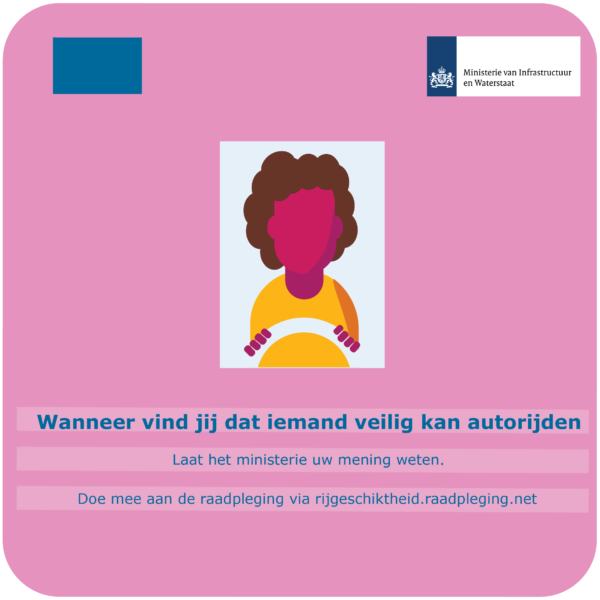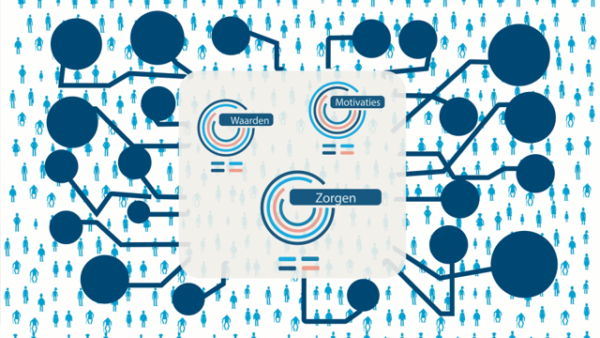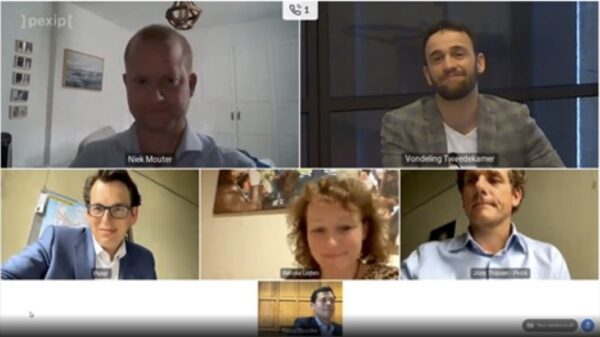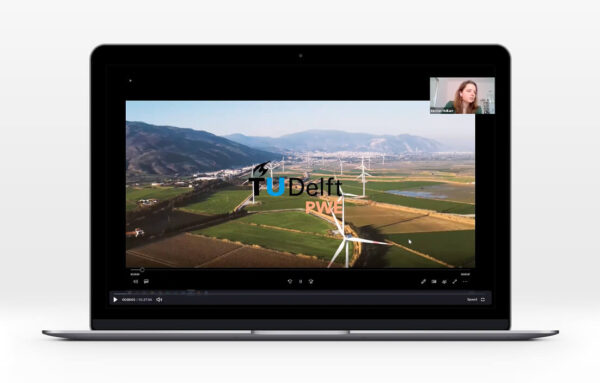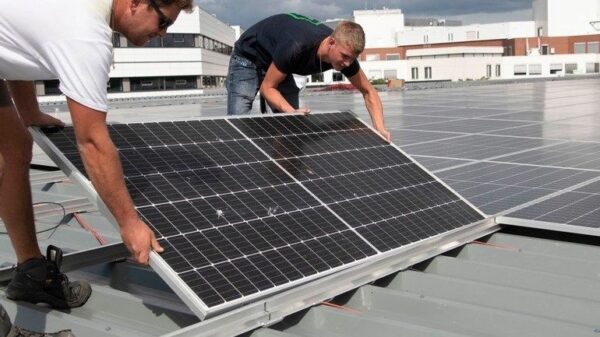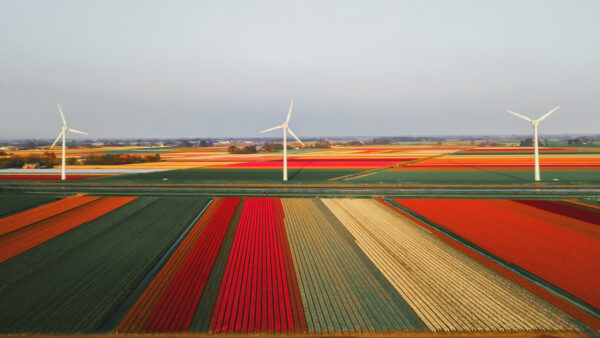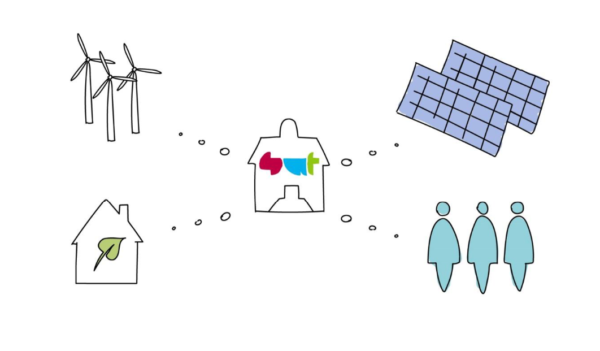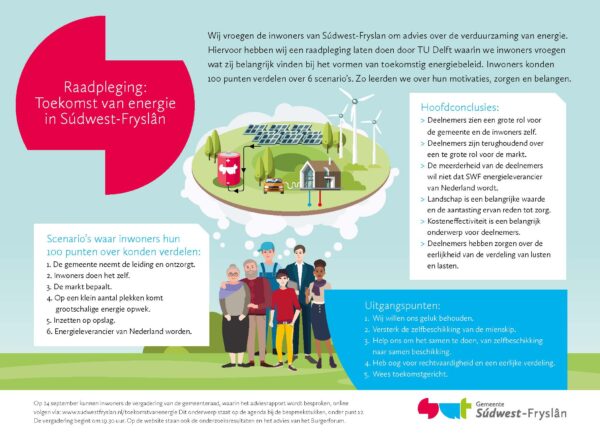Double celebrations!
Double celebrations!
We have something to celebrate! When it’s time for the holidays, we have an extra party at Populytics. Because Populytics celebrates its birthday and turns 1! And of course we would like to share this milestone with you.
A lot has happened in the past year. We have advised organizations, companies and government bodies on their policy with the help of more than 50,000 Dutch people. And that’s something to be proud of! We also stood out in the media with our projects. For example, our research on corona measures appeared several times in the Dutch national media this summer. The highlight is a publication in Linda Magazine about our consultation on the medical inspection of driving license holders ????.
But a lot has also happened within the organization. For example, we opened our first office in Leiden and we were able to hire the first permanent employees. In addition, we had a highlight with our software developers where we built our software from the ground up and have now created a scalable first version of the Wevaluate platform!
The year has flown by, thanks in part to all those who, like us, believe in the benefits of involving citizens in policy making. That is why we want to put our partners in the spotlight: TU Delft, Public Mediation, Councyl and the Nederlands Platform Burgerparticipatie en Overheidsbeleid. Thank you for your support and cooperation!
And of course we would like to thank all the people who took part in the studies and who shared their visions, ideas and considerations with us. We can’t wait to get even more input from you with the deployment of Wevaluate in the coming year.
Now it’s time to relax and enjoy. We wish everyone happy holidays and a happy new year!
Meer nieuws
Nieuws
Minister Visser presents the results of Populytics consultation on Medical Fitness for Driving to the House of Representatives
Minister Visser presents the results of Populytics consultation on Medical Fitness for Driving to the House of Representatives
Today, Minister Visser of the Ministry of Infrastructure and Water Management presented the report of the Populytics consultation on the medical examination of driving license holders to the House of Representatives. This report contains the results of a consultation in which 6.681 Dutch people advise on the medical examination of driving license holders.
Download the report with the results of this consultation here (in Dutch).
Some people are able to drive less safely due to their health. This may be because they are able to see less or react less quickly to their environment, or because they are taking medicines that make them less alert. To find out who has difficulty with driving safely, there is a system to test people’s medical fitness to drive. The Ministry of Infrastructure and Water Management wanted to find out to what extent this system should be changed, according to citizens. That is why Populytics organized a large-scale consultation in the summer of 2021 in which 6.881 citizens participated. Participants advised on the current structure of the system and advised on seven possible options for adapting the system.
The consultation on the medical fitness to drive system was well received by participants. 75% of the participants thought this was a good way to involve Dutch people in choices about laws and regulations and 78% of the participants thought that the government should use our consultation method more often to involve Dutch people in government policy.
Meer nieuws
Good news, you can contribute again! What should the medical examination for driving licenses look like? Yesterday a consultation went live in which you are asked that question. All Dutch citizens can participate. Make sure to give your advice.
Today the results of the climate consultation were officially handed over to the Lower House. Niek spoke with members of the Lower House to explain the results and answer any questions. The Lower House was enthusiastic about our methods and found the results useful.
Nieuws
How a consultation strengthens a citizens’ forum
How a consultation strengthens a citizens’ forum
A consultation reveals the voice of the ‘quiet middle’ in a citizens’ forum. And that is necessary. Because not everyone has the time or inclination to participate intensively in a forum for evenings in a row. It is precisely the combination of a consultation in which a large, diverse group participates and a citizens’ forum in which a small group of citizens participates very intensively that makes the total outcome powerful.
Niek Mouter was interviewed by Algemeen Dagblad about how a consultation can strengthen a citizens’ forum. Read it online here or via this link (written in Dutch).
Meer nieuws
Good news, you can contribute again! What should the medical examination for driving licenses look like? Yesterday a consultation went live in which you are asked that question. All Dutch citizens can participate. Make sure to give your advice.
Today the results of the climate consultation were officially handed over to the Lower House. Niek spoke with members of the Lower House to explain the results and answer any questions. The Lower House was enthusiastic about our methods and found the results useful.
Nieuws
What does society think: how should the government deal with the corona virus in the future?
What does society think: how should the government deal with the corona virus in the future?
A large part of the Dutch population has now been vaccinated against COVID-19 and the pressure on healthcare has decreased in recent months. How the virus will develop in the coming months is uncertain. Will COVID-19 remain manageable in the coming months or will the number of infections and hospital admissions rise again quickly in the coming months?
The future corona policy
The government would like to be properly prepared for different developments of the virus. On behalf of the RIVM, Populytics is conducting a consultation in which all Dutch people aged 18 and older are given the opportunity to voice their thoughts and opinions on which factors they consider important when taking corona measures in different scenarios.
Structure of the consultation
In the first part, participants are presented with a possible development of the coronavirus six different times. For example, “the virus remains manageable” or “there is a new, more contagious variant that the vaccines work less well against”. In each situation, participants are shown 2 packages of measures, including the effects of these measures (for example, effect on the number of infections and the number of admissions to the IC). You are always asked to advise one of the two packages. Opponents of corona policy can also indicate that they believe that no measure should be introduced. Finally, participants are asked why they consider certain measures acceptable or unacceptable.
Meer nieuws
Good news, you can contribute again! What should the medical examination for driving licenses look like? Yesterday a consultation went live in which you are asked that question. All Dutch citizens can participate. Make sure to give your advice.
Today the results of the climate consultation were officially handed over to the Lower House. Niek spoke with members of the Lower House to explain the results and answer any questions. The Lower House was enthusiastic about our methods and found the results useful.
News
Consultation on the structure of medical examinations for driving licenses
Consultation on the structure of medical examinations for driving licenses
Good news, you can contribute again! What should the medical examination for driving licenses look like? Yesterday a consultation went live in which you are asked that question. All Dutch citizens can participate. Make sure to give your advice.
The Minister would like to hear your opinion
Cora van Nieuwenhuizen wants to know how the government can best determine whether someone is healthy enough to drive safely. That is why she is asking for your opinion in the consultation. For example, should drivers from a certain age receive a medical examination in your opinion? And should drivers or their doctors be required to report certain medical situations?
Together with the Ministry of Infrastructure & Water Management we have worked intensively to develop the consultation, which is now online: denkmeeoverkeuren.nl.
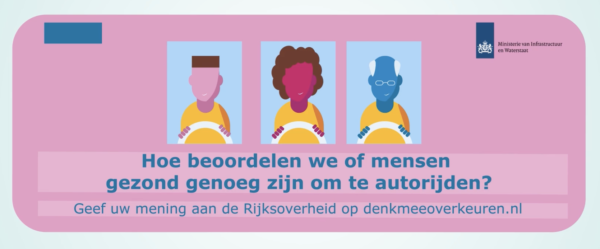
Structure of the consultation
In the consultation you will be presented with various choices. For each choice the effects are shown. What will it cost drivers if you choose a particular option? And what will it cost the government? But also: what is the effect on road safety?
After the various options, a number of scenarios are presented to you as well. Which scenario do you find most appealing?
Furthermore, at the end there is room to share your own experiences with regard to the current set-up.
Until when can you participate?
Until August 5, the consultation will be open to everyone. Would you like to advice the government on the structure of the medical examination for driving licenses? Make sure you fill in the consultation before then. You can find the consultation here: denkmeeoverkeuren.nl.
We, as well as the Ministry of Infrastructure & Water Management, would like to hear what you think.
More news
Today the results of the climate consultation were officially handed over to the Lower House. Niek spoke with members of the Lower House to explain the results and answer any questions. The Lower House was enthusiastic about our methods and found the results useful.
Today the Webinar “Engaging citizens in energy transition” took place. This webinar was a collaboration between TU Delft’s PVE Lab and Populytics during which we discussed two recent consultations: 1) a citizen-initiated consultation on the heat transition in the Amsterdam district of Nieuw Sloten, and 2) a consultation combined with a citizen forum on the future energy policy of the municipality of Súdwest-Fryslân.
News
In conversation with members of the Lower House about the climate consultation
17 June 2021
In conversation with members of the Lower House about the climate consultation
Today the results of the climate consultation have been shared with the Lower House.
What will the climate policy be in the coming years?
Over the past few months, the PWE-lab from the TU Delft together with the University of Utrecht has conducted a public consultation on climate measures. This in response to a request from the Lower House. The new government will have to take extra climate measures, if the Netherlands is to achieve the EU’s climate targets. Before deciding which climate measures will be taken, the government wanted to hear the advice from its society.
The citizen in the decision-maker’s seat
More than ten thousand people participated in the consultation. The participants were presented ten climate measures, together with an explanation of the effects and costs of these measurement for the government. Participants were bound to a governmental budget that they could spend on climate measures. This way, the dilemma and the choices that the government faces were simulated as best as possible.
Handing over the report
The input of all participants and the results of the consultation have been compiled into a hefty, multi-page report. Today this report was officially handed over to the Lower House and to Ed Nijpels, Chairman of the Climate Agreement Monitoring Committee. Niek also gave a technical briefing today to the Lower House, to explain the results and answer questions the House might have.
Niek: “I am pleased that the members of the Lower House were enthusiastic about our method and that they found the results useful.”
What does the population find important?
The report showed that three quarters of the population supports more ambitious climate measures, but only if three conditions are met:
- Low incomes must be protected
- Polluters must pay
- The benefits must be greater than the costs
Ed Nijpels responded by saying that he is pleased that a vast majority supports climate policy, but that it is up to the politicians to ensure that the conditions are met properly. If politicians can do that, the willingness among citizens will be high.
To be continued
The Lower House will delve deeper into the report in the coming period. The new cabinet will take the results of the consultation into account in the choices they will make regarding climate policy.
More news
Today the Webinar “Engaging citizens in energy transition” took place. This webinar was a collaboration between TU Delft’s PVE Lab and Populytics during which we discussed two recent consultations: 1) a citizen-initiated consultation on the heat transition in the Amsterdam district of Nieuw Sloten, and 2) a consultation combined with a citizen forum on the future energy policy of the municipality of Súdwest-Fryslân.
Where, how and how much solar and wind energy can we generate in the region by 2030? In the Foodvalley region, representatives of stakeholders are working with 8 municipalities, 2 provinces and 2 water boards to come up with the Regional Energy Strategy (RES) plan. A group of residents from throughout the region – a citizens’ forum – wrote an advisory report on how this regional plan could take into account what the residents consider important. Populytics carried out a consultation among the residents of Foodvalley Region in support of this advice.
Nieuws
Ten lessons about citizen participation
Ten lessons about citizen participation
Today the Webinar “Engaging citizens in energy transition” took place. This webinar was a collaboration between TU Delft’s PVE Lab and Populytics during which we discussed two recent consultations: 1) a citizen-initiated consultation on the heat transition in the Amsterdam district of Nieuw Sloten, and 2) a consultation combined with a citizen forum on the future energy policy of the municipality of Súdwest-Fryslân. In preparation of this webinar, we reflected on the conditions needed for successful citizen participation. We came up with the following list; do you have any additions?
Upfront:
- There should be a policy dilemma with various alternatives that still can be implemented.
- Begin public participation when they can still inspire you/decision-maker.
- Have the courage as a government, to present dilemmas to your citizens
- Think about the goals you want to achieve with participation and communicate this clearly
During:
- Involve citizens in the design of the consultation
- Good substantive and communication support from the organization
- Send letters / good recruitment campaign
After:
- Enable a citizens’ forum or group of citizens to convert the learnings from the consultation into (normative) recommendations
- Involve a group of the participating population in determining which analyses are relevant
- As a decision-maker show what you have learned from the participating population (and what you will do with the results)
More news
Where, how and how much solar and wind energy can we generate in the region by 2030? In the Foodvalley region, representatives of stakeholders are working with 8 municipalities, 2 provinces and 2 water boards to come up with the Regional Energy Strategy (RES) plan. A group of residents from throughout the region – a citizens’ forum – wrote an advisory report on how this regional plan could take into account what the residents consider important. Populytics carried out a consultation among the residents of Foodvalley Region in support of this advice.
Windmills on land, increasing the price of gas or a meat tax? What does Dutch society think about Dutch climate policy? Researchers from TU Delft and Utrecht University are using a Participatory Value Assessment (PVE) to give thousands of Dutch people the opportunity to comment on this. Populytics supported them throughout the process.
Nieuws
Citizens’ Forum Foodvalley Region advisory
Citizens’ Forum Foodvalley Region advisory
Where, how and how much solar and wind energy can we generate in the region by 2030? In the Foodvalley region, representatives of stakeholders are working with 8 municipalities, 2 provinces and 2 water boards to come up with the Regional Energy Strategy (RES) plan. A group of residents from throughout the region – a citizens’ forum – wrote an advisory report on how this regional plan could take into account what the residents consider important. Populytics carried out a consultation among the residents of Foodvalley Region in support of this advice.
More information about this participation process can be found here.
Several media outlets reported on this project:
https://www.omroepgelderland.nl/nieuws/6792310/Inwoners-adviseren-gemeente-over-de-energietransitie
More news
Windmills on land, increasing the price of gas or a meat tax? What does Dutch society think about Dutch climate policy? Researchers from TU Delft and Utrecht University are using a Participatory Value Assessment (PVE) to give thousands of Dutch people the opportunity to comment on this. Populytics supported them throughout the process.
Recently Populytics CEO, Shannon Spruit was interviewed by the magazine Democracy in Action. In the article she explains how Participatory Value Evaluation can support local decision-making.
Nieuws
Researchers give all Dutch people the chance to think about climate policy
Researchers give all Dutch people the chance to think about climate policy
Windmills on land, increasing the price of gas or a meat tax? What does Dutch society think about Dutch climate policy? Researchers from TU Delft and Utrecht University are using a Participatory Value Assessment (PVE) to give thousands of Dutch people the opportunity to comment on this. Populytics supported them throughout the process.
More news
Recently Populytics CEO, Shannon Spruit was interviewed by the magazine Democracy in Action. In the article she explains how Participatory Value Evaluation can support local decision-making.
The project, ‘The energy transition as a joint decision of municipality and community of municipality Súdwest-Fryslân has been nominated for the Galjaard Prize. Populytics’ researchers Shannon Spruit and Niek Mouter contributed to this innovative citizen participation project.
Nieuws
Insight into residents’ values in Súdwest-Fryslân’s energy policy thanks to PVE method
Insight into residents’ values in Súdwest-Fryslân’s energy policy thanks to PVE method
Recently Populytics CEO, Shannon Spruit was interviewed by the magazine Democracy in Action. In the article she explains how Participatory Value Evaluation can support local decision-making. Ending with this comprehensive list of tips, and the benefits of PVE for municipalities and residents:
Benefits for municipalities:
- PVE makes mass participation much easier and therefore more attainable.
- Decision-makers reach residents who do not normally participate in activities.
- The silent middle group becomes visible.
- The identified values are relevant beyond the issue at stake in the consultation.
Benefits for residents:
- Residents can choose when and where they participate and are included in difficult policy decisions.
- They can step into the shoes of a decision-maker and discover the complexity behind policy choices.
- In a safe environment residents are able to voice their opinions without bias.
Tips for municipalities:
- Think about your goals. This form of participation is most valuable if you really want to involve people in the policy and not only inform them.
- Manage expectations. If they exist, make consequences clear for the participating population.
- Think about the follow-up. Do not see participation and the use of this method as a one-off, but as a step towards improving the future relationship with your residents.
- Take the time to determine the right questions, how will you learn the most from your participants.
More news
The project, ‘The energy transition as a joint decision of municipality and community of municipality Súdwest-Fryslân has been nominated for the Galjaard Prize. Populytics’ researchers Shannon Spruit and Niek Mouter contributed to this innovative citizen participation project.
